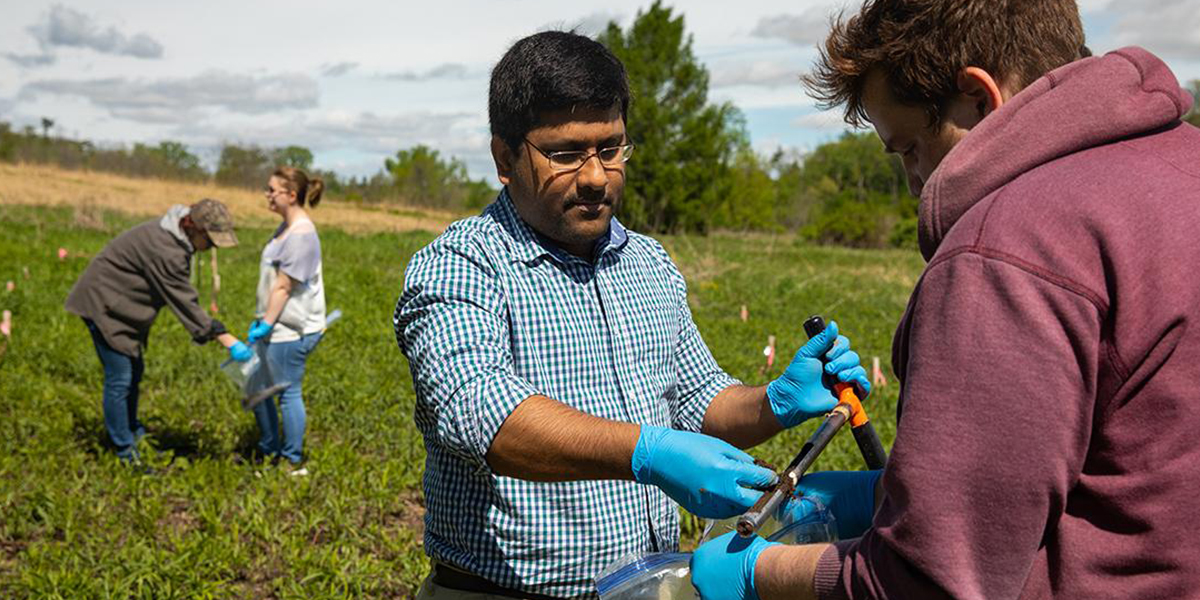
$750,000 federal grant brings new opportunities to Soil and Crop Science program in the School of Agriculture
Dr. Muthu Venkateshwaran, assistant professor in the University of Wisconsin-Platteville School of Agriculture, was recently selected to receive the prestigious CAREER Award from the National Science Foundation. The $750,000 award – the largest in the School of Agriculture’s more than 100-year history – will fund up to five years of research in the area of plant-microbe symbioses.
The highly-competitive NSF-CAREER Program recognizes outstanding early career faculty who exemplify the role of teacher-scholar through the integration of education and research within the context of their institution’s mission. Venkateshwaran is the first CAREER Award recipient from UW-Platteville. The NSF grant will benefit Venkateshwaran’s research and expand outreach to UW-Platteville students, area high school teachers and high school students.
Venkateshwaran’s research focuses on the symbiotic associations that exist between plants and microbes, such as rhizobia, a soil bacteria that associates with legumes to form root nodules, inside which the rhizobia fixes atmospheric nitrogen that is then used by the legume plant. Arbuscular mycorrhizal fungi is another symbiont that promotes crop nutrition. Decades of genetic studies suggest the existence of a Common Symbiotic Pathway controlling these two symbioses. Although the scientific community has made tremendous progress in understanding the molecular mechanisms that establish these mutualistic associations, there are missing links that need to be identified.
"It is a strong encouragement and motivation that the NSF program directors have confidence and trust in my research program, our institution and our capability in fulfilling such a big grant. Not only do they trust in our research capabilities, but also our students, who will be the main researchers along with the newly hired research technician, in carrying out the tasks." – Dr. Muthu Venkateshwaran
Venkateshwaran’s proposed research will explore the gaps in the understanding of the symbiotic signaling pathways and identify methods to improve associations between symbiotic microbes and crop plants. Ultimately, the goal is to transfer the legume-rhizobia symbiotic signaling machinery to non-leguminous crops and enable associations with nitrogen-fixing bacteria, leading to more sustainable, eco-friendly and cost-effective crop production.
“It is really honoring and humbling to receive this prestigious award,” said Venkateshwaran. “It is a strong encouragement and motivation that the NSF program directors have confidence and trust in my research program, our institution and our capability in fulfilling such a big grant. Not only do they trust in our research capabilities, but also our students, who will be the main researchers along with the newly hired research technician, in carrying out the tasks. This project will act as an excellent vessel for the training, recruitment, and retention of students in STEM-related fields, while providing much needed information for our stakeholders (farmers and plant breeders) in crop improvement and promoting sustainability in crop production.”
Undergraduate student researchers will have more opportunities than ever before to work in the areas of functional genomics and bioinformatics on UW-Platteville’s campus. “We will be using whole genome sequencing approach and advanced bioinformatics tools in analyzing large dataset in identifying and characterizing novel genetic players,” said Venkateshwaran. “Students will also be trained in classical, popular and cutting-edge techniques, such as the CRISPR/Cas9-based precision genome editing tool for functional characterization of candidate genes, which is currently revolutionizing many fields, including agriculture.”
The award will also allow for the hiring of a full-time research technician, which will lead to more individualized training with students in the lab, and ultimately, a greater number of students involved in the research.
Benefits of the grant will extend outside of the university. A key criteria of the NSF grant is a demonstrated community outreach component. Venkateshwaran plans to annually organize and conduct a "research and curriculum development workshop" for area high school teachers and a "biotechnology boot camp" for high school students. He plans for the first week of the two-week summer program to be geared towards area high school teachers, who will come to campus and work on research-based curriculum development for high school students in the area of plant biotechnology. In week two, those teachers will each bring two students from their high schools to attend the camp and learn about biotechnology, genetics and microbiology.
“This will give the teachers an opportunity to teach the curriculum they just developed to see how it goes,” explained Venkateshwaran. “Each teacher will demo the curriculum that they developed in the first week in a classroom setting.”
With its capability for cutting-edge research, large student involvement and outreach component, this award has the potential to be transformational to the Soil and Crop Science program, according to Dr. Rami Reddy, director of UW-Platteville’s School of Agriculture. “Dr. Muthu is an outstanding faculty member with many significant achievements to his credit in teaching, research and advising,” said Reddy. “Students are thrilled to take his classes and he mentors numerous undergraduate researchers in the plant biotechnology lab. With strong undergraduate student research – which is a high impact practice – and an outreach component built into this five-year grant, this will be a turning point that helps with recruitment and placement of undergraduate students in our soil and crop science program.”